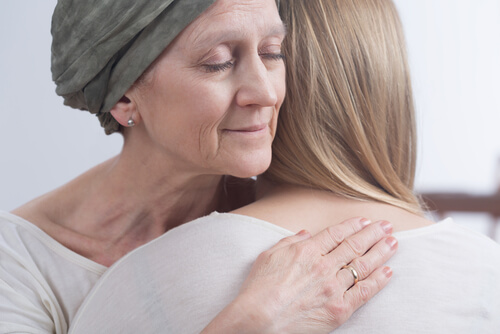Breast Cancer: The Different Phases of Confronting the Disease

In this article we’d like to share with you the different phases a woman faces when she is diagnosed with breast cancer. So, let’s try an empathy exercise, difficult as it may seem. Imagine that the doctor just gave you this diagnosis. What do you feel? What are you thinking? How does a woman react to the impact of the disease? What are the phases that she goes through mentally?
Breast cancer involves the accelerated and uncontrolled proliferation of glandular epithelial cells. These cells have greatly increased their reproductive capacity. Breast cancer cells can spread through the blood or lymphatic vessels and reach other parts of the body, thus generating metastases. Whether or not this process has begun is very important information to discuss when making a prognosis of the disease.
Regarding epidemiology and risk factors, it should be mentioned that it is more common among Spanish women. However, thanks to advances in medicine, mortality from breast cancer has declined in recent years.
How is breast cancer treated?
On the one hand, an oncology specialist will be responsible for the physical process of treating the disease. This includes surgery to remove the tumor, radiotherapy, application of chemotherapy, and the decision to include hormonal therapy. On the other hand, the doctor must take into account the patient’s own characteristics, such as psychological strength, when it comes to planning the medical intervention.

A psychologist is also essential in every therapeutic process of the treatment. Does the patient know, understand, and accept the disease? It is necessary that, from the moment of diagnosis, a psychologist is there to support, help, and promote emotional venting and the correct handling of information. In addition, a psychologist can be a key figure in increasing adherence to treatment by the patient, as well as in the management of their expectations.
“You can be a victim of cancer or a survivor of it. It is a way of thinking.”
-Dave Pelzer
Phases a person goes through after cancer diagnosis
As Kubler-Ross discusses, there are different phases that a person goes through when cancer is detected. For this reason, it is essential that we take the stage in which the cancer was found into account. The support, help, and method of carrying out the therapeutic process will be different depending on the stage.
At first, the patient will feel denial. They might refuse to believe they have cancer. In many cases, the patient wants to be tested several times to verify the diagnosis, or asks for other points of view in case the diagnosis was a mistake.
Then, denial vanishes and becomes anger. Anger and hostility could include casting blame for their situation on doctors, themselves, or relatives. Afterwards, the patient can enter a phase of depression in which they feel weak, with no desire to fight. Sadness and fear are the center of their day-to-day moods.
Next, the patient enters the negotiation phase. In this phase, they often use the phrase “What would have happened if. . .” Secretly, the patient tries to make a deal with herself. It is a defense mechanism to protect her from the reality of cancer. She is not yet ready to accept that she is sick.
Finally, the patient reaches the phase of acceptance. They accept their disease and from that moment, the patient will begin to live with their problem. They can now fight directly against cancer.
“I work grief and sadness out of my body when I dance, and I bring in joy and rhythm.”
-Inga Muscio
How can we help during each phase?
From a therapy point of view, a woman diagnosed with breast cancer must be accompanied through each phase. Someone should be there to alleviate her pain until she reaches acceptance of her illness. From that moment, we should continue to walk by her side during the treatment process. It is fundamental that we reduce the uncertainty that women may have about cancer. We should provide psycho-education about the disease itself, and about the therapies and techniques that will be used to improve her physical and mental state.
“Cancer is a word, not a sentence.”
-John Diamond

For this reason, it is essential to remember that step-by-step, the different phases will be overcome with help and support. We will walk with through the process with the sufferer with positivity and energy. Of course, there will be bad days, but even within those there will be positive details to keep her moving forward. It could be the smile of a child, the kiss of a young couple, a loving word from a friend, a walk in the mountains. . .
Each phase has its moment, but, in one way or another, an evolution occurs and the person has to accept the disease. She has to understand that she has a disease, not that she is sick. From there, knowing and recognizing fears, anxieties and uncertainties, and showing strength, energy, and positivity, will help win the battle.
Women with breast cancer, you are brave, beautiful fighters. Have courage on the path ahead!
This text is provided for informational purposes only and does not replace consultation with a professional. If in doubt, consult your specialist.








